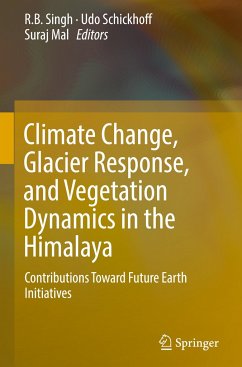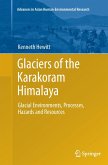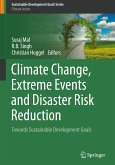This book provides information essential for anyone interested in climate and environmental change of the Himalayan region, including land and resource managers, environmental planners, conservationists, environmentalists, geographers, climatologists, ecologists, and students. The book is unique in its coverage of the current understanding of the science of climate change in the Himalayan mountain system and of the major impacts on physical systems and ecosystems. The book gives an overview of the physical science basis of climate change and explains drivers and processes of glacier and vegetation dynamics.
The book covers relevant aspects of accelerated climate change observed in the Himalayan mountain system, and highlights the regional differentiation of climatic changes and associated environmental modifications. The focus is on climate variability and change, and how physical systems and ecosystems respond to climate change impacts. Consequences include impacts on physicalsystems such as glacier shrinkage, glacial lake outburst floods, altered hydrological characteristics, permafrost warming and thawing, and mass movements on slopes. Climate change is also a powerful stressor on ecosystems and induces range shifts of plant and animal species and alterations in terms of phenology, biomass, plant cover, plant group dominance and species composition. Thus, ecosystem structure and functioning will be strongly affected.
The book has an introductory chapter followed by a section on climate change, a section on impacts on glaciers and hydrology, and a section on vegetation dynamics. Each section has several chapters presenting key concepts, major drivers and key processes of environmental change in the Himalayan region from different perspectives. Climate change impacts in the Himalaya have not been studied in much detail, and respective findings were not presented so far in a comprehensive overview. This book summarizes the current knowledge of interactions between climate change and the dynamics of glaciers, hydrology, and vegetation.
The book covers relevant aspects of accelerated climate change observed in the Himalayan mountain system, and highlights the regional differentiation of climatic changes and associated environmental modifications. The focus is on climate variability and change, and how physical systems and ecosystems respond to climate change impacts. Consequences include impacts on physicalsystems such as glacier shrinkage, glacial lake outburst floods, altered hydrological characteristics, permafrost warming and thawing, and mass movements on slopes. Climate change is also a powerful stressor on ecosystems and induces range shifts of plant and animal species and alterations in terms of phenology, biomass, plant cover, plant group dominance and species composition. Thus, ecosystem structure and functioning will be strongly affected.
The book has an introductory chapter followed by a section on climate change, a section on impacts on glaciers and hydrology, and a section on vegetation dynamics. Each section has several chapters presenting key concepts, major drivers and key processes of environmental change in the Himalayan region from different perspectives. Climate change impacts in the Himalaya have not been studied in much detail, and respective findings were not presented so far in a comprehensive overview. This book summarizes the current knowledge of interactions between climate change and the dynamics of glaciers, hydrology, and vegetation.
"The collection of chapters represents an in-depth analysis of trends in temperature and precipitation in different areas of the region. ... The editors of this volume have created an excellent work that integrates climate change in the Himalayas with numerous ecological dynamics. Summing Up: Recommended. Graduate students, researchers, professionals." (J. L. Hatfield, Choice, Vol. 54 (5), January, 2017)
"The focus on elevation and the diversity of topics presented within this book represent its greatest strengths. ... the book provides both breadth and detail on ongoing environmental changes in the Himalayas. ... it would be suitable for researchers and graduate-level students working in the region on a variety of topics, or as a reference book for upper-level courses on mountains and environmental change." (Joseph Shea, Mountain Research and Development, Vol. 37 (3), August, 2017)
"The focus on elevation and the diversity of topics presented within this book represent its greatest strengths. ... the book provides both breadth and detail on ongoing environmental changes in the Himalayas. ... it would be suitable for researchers and graduate-level students working in the region on a variety of topics, or as a reference book for upper-level courses on mountains and environmental change." (Joseph Shea, Mountain Research and Development, Vol. 37 (3), August, 2017)








